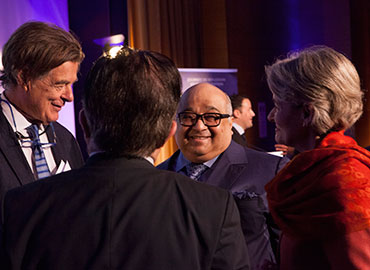
|
Sheikh Mohamed Bin Issa Al Jaber gives keynote speech at Day of Mobilization against Radicalization and for the Future of the Youths of Europe, the Middle East and Africa on January 28, in Paris.Our Patron and Chairman Sheikh Mohamed Bin Issa Al Jaber gave the keynote speech at the Day of Discussion and Mobilization entitled ‘The youth of Europe, The Middle East and Africa and the rise of Terrorism, Extremism and Intolerance – what Options for the Future?’
The day was organised by Projet Aladin in conjunction with UNESCO, the European Commission and the French National Ministry of Education, and took place at the Ministry of Education, Higher Education and Research in Paris. Abe Radkin, Executive Director of Projet Aladin remarked “As a globally-recognised leader in the field of education, your vision and the ideas that you shared with our distinguished guests had a powerful impact on the discussions throughout the day.” The text of Sheikh Mohamed’s speech may be read below:
Madame Director General of UNESCO, Monsieur Executive Director of Aladdin Project, Monsieur Representative of the Higher Education Ministry in France, Your Excellencies, Ladies and Gentlemen Allow me to greet all of you, and to congratulate the organizers of this importance conference, which addresses one of the most important topics of our times, this is the issue of youth and the problems of extremism, terrorism and intolerance. UNESCO was right to do so, because the youth not only shoulder the great responsibility in leading the political, social, and economic change, but also of taking charge of the future in their countries. The MBI Al Jaber Foundation, our organization, has contributed for 20 years to promote this approach through hundreds of scholarships provided to young men and women who have become today leaders in their own countries, especially in the economic and political fields. Ladies and gentlemen, The phenomenon of violence and terrorism that we are witnessing today, which has unfortunately lured a number of young people under the age of thirty, require all of us – countries, international organizations, private section, and non-governmental organizations – to give it the proper care and attention it warrants. We must act on our responsibility to confront violence, extremism, and intolerance on the different national, regional, and international levels. This in my view requires:
Finally, it must be emphasized that the phenomenon of violence, extremism, and pointless confrontations that we witness today in the Arab region and beyond requires from us men and women, youth and elderly to work hand in hand to end it, regardless of the religions that we follow, the civilizations that we belong to, the languages that we speak, and the minor and major identities that we embrace. And we must also work with UNESCO, which recently celebrated its 70th anniversary, and with all the organizations and international committees and NGOs in order to promote the values of tolerance, dialogue, and coexistence, and to embrace the culture of peace instead of the culture of war, violence, and destruction. I hope at the end that the whole world will stand united with the rights of nations to freedom, dignity, and to stop the violence, destruction, and chaos that we see today in the ugliest forms in more than one Arab country. I wish you luck and success. Thank you, Mohamed Bin Issa Al Jaber For further information, please contact: |


